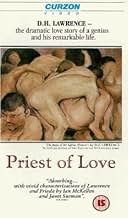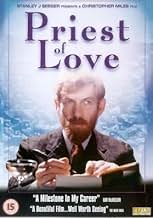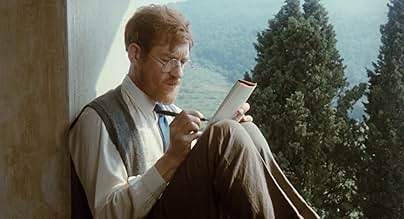Following the banning and burning of his novel, "The Rainbow", D.H. Lawrence and his wife, Frieda, move to the United States, and then to Mexico. When Lawrence contracts tuberculosis, they r... Read allFollowing the banning and burning of his novel, "The Rainbow", D.H. Lawrence and his wife, Frieda, move to the United States, and then to Mexico. When Lawrence contracts tuberculosis, they return to England for a short time, then to Italy, where Lawrence wrote "Lady Chatterley's ... Read allFollowing the banning and burning of his novel, "The Rainbow", D.H. Lawrence and his wife, Frieda, move to the United States, and then to Mexico. When Lawrence contracts tuberculosis, they return to England for a short time, then to Italy, where Lawrence wrote "Lady Chatterley's Lover".
- Director
- Writers
- Stars
- Dr. Uhfelder
- (as Mike Morris)
- Director
- Writers
- All cast & crew
- Production, box office & more at IMDbPro
Featured reviews
The lead performances are believable and interesting and the second half is more accessible and enlightening than the first as you get closer to the couple's lives and Lawrence's vigorous self belief. The first half though is played out too fast, moving very quickly across the globe with the man having hissy fits with little explanation. Nice support from Penelope Keith.
Probably needs watching more than once.
It is therefore perhaps not surprising that after the war Lawrence and Frieda decided to leave Britain and to lead a peripatetic existence wandering around the world, a journey that would take them to France, Italy, Australia, Mexico and the USA. They did so partly because Lawrence needed a warmer climate for the sake of his health- he was suffering from the tuberculosis that would eventually kill him- but the way in which he had been treated in the UK must also have been a factor. The film follows them on their journey and also deals with the writing of Lawrence's last and most controversial novel, "Lady Chatterley's Lover", compared to which "The Rainbow" is about as racy as a children's nursery rhyme.
Although the film features some major names of the British cinema and a bona fide Hollywood goddess in the shape of Ava Gardner, it seems to have aroused little attention. It was not a success on its release in 1981, and I had never heard of it before I recently caught it on television. I note that mine is only the third review of it on this site which suggests that few other people had heard of it either.
And the reason nobody seems to have heard of it is that, frankly, it is not very good. Probably the best acting comes from John Gielgud in a cameo as the pompous Herbert G. Muskett, the reactionary functionary charged with protecting the British people from exposure to literature and who seemed to take a particular delight in persecuting Lawrence. None of the other cast members, however, stand out. Although the title hints at Lawrence's passionate nature, you get little idea of this from Ian McKellen's surprisingly passionless performance. Janet Suzman's Frieda seems too unsympathetic, with the sort of cinematic German accent more normally associated with Nazis barking "ve haff vays und means". Both these performances came as a disappointment to me, because both McKellen and Suzman have been much better in other films.
The screenplay was based upon a non-fiction biography of Lawrence, not always the best source to use when making a fictionalised biopic. The resulting film is just a tedious drawn-out chronicle of two people, one of them seriously ill, journeying around the world, with various artistic and literary celebs from the 1920s occasionally popping up. ("Oh look! Is that Aldous Huxley over there? And could that be Katherine Mansfield? Quick, or else you'll miss her"). Screenwriter Alan Plater and director Christopher Miles might just as well have tried to film the entry on Lawrence from the Encyclopaedia Britannica. Had they done so the result could hardly have been duller than what they actually came up with. 4/10
Christopher Miles did a wonderful adaptation of "The Virgin and the Gypsy" 10 years before he made this film. He certainly is a scholar of Lawrence and a talented filmmaker, so why was this film so charmless and seem so shallow.
I will give a couple of reasons: First, I saw the 99 minute recut of the film. I imagine/hope that the apparently lost original 125 minutes was less choppy and jumpy.
Second, Ian McKellan was a terrible choice for the lead. He simply was too much of a stage actor at this point of his career and he plays most scenes for the the benefit of the baloney.
Third, the beginning shows Lawrence having a nude swim with a homosexual lover. The rest of the movie is about his love affair with his German wife. It is just confusing and undercuts the rest of the movie as we expect him to run off and leave his wife for a man at some point.
Fourth, the movie portrays Lawrence as a one dimensional lone victim of censorship, surely there were other writers being censored at the time and many powerful people supporting his rights to freedom of speech. Making the censor a buffoon (played dully by John Gielgud) doesn't help, but seems to trivialize the issue.
Fifth, Miles may have been to close to the material. He wants to give us a lot of factual information about Lawrence, but the history lesson feels like a history lesson, and there is little dramatic tension. Janet Suzman as Frieda Lawrence seems to carry the weight of whatever dramatic tension there is.
The movie does have nice cinematography. However all the movies adapted from Lawrence's work also have great cinematography and much better characters and stories.
"Priest of Love" is a rather superficial and dull biography. While D. H. Lawrence's work was very controversial in its day and resulted in some well publicized book burnings and his personal life was weird (to say the least), this film never piqued my interest. Perhaps it was the flat performances by the leads or the script. Perhaps it was because Lawrence wasn't a man whose life I would want to emulate. However, I think the main problem is that the life of Lawrence would best be summed up in a mini-series and condensing about twenty years of his life into a film is a tall order. So, because so much time passes, it comes off more like a Cliff Notes version of his exploits. My recommendation is that you instead read up on Lawrence and his life...you'll learn more and it won't be so dreadfully lifeless as this movie.
Did you know
- TriviaThis movie was released on the 51st Anniversary year of the death of author D.H. Lawrence.
- Quotes
Herbert G. Muskett: [looking at a copy of Lawrence's book "Kangaroo"] It does not appear to be obscene in absolutely legal terms. Anti-British to the point of insanity.
Clerk to Herbert G. Muskett: Apparently, Mr. Lawrence is going to America.
Herbert G. Muskett: We must inform the authorities.
Clerk to Herbert G. Muskett: It's been attended to, Mr Muskett.
[reaching for the book]
Clerk to Herbert G. Muskett: Shall I take this?
Herbert G. Muskett: Leave it. I shall read it again. To make absolutely sure
[recommences intense study of the book]
- Alternate versionsAn abridged 99 minute "Centenary version" was released in 1985 in the UK to better box office and critical acclaim to commemorate the birth of D.H.Lawrence. As well as inevitable cutting of some material the shortened version also rearranges the placement of some of the flashback sequence and ends with Lawrence's death excluding the New Mexico epilogue. The short version is a properly re-prepared effort however with the appearance order end-credits redone to reflect the new positions in which characters first appear. Copies of the 1981 version, which was first released in the UK during the 1982 Falklands War when theatre going plummeted, now no longer exist.
- SoundtracksThe Way We Get It Together
music by Francis James Brown and Stanley Joseph Seeger (as Joseph James)
Lyrics by Christopher Cone
Played by The Pasadena Roof Orchestra
- How long is Priest of Love?Powered by Alexa







































